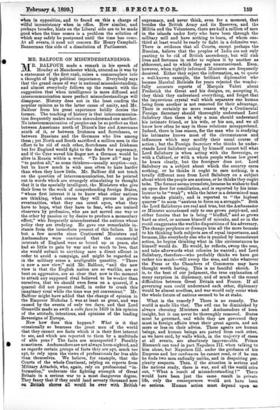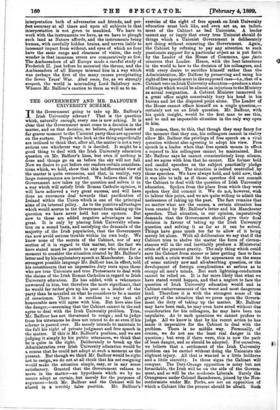MR. BALFOUR ON MISUNDERSTANDINGS.
MR. BALFOUR made a remark in his speech of Monday at Manchester which, uttered as it was by a statesman of the first rank, raises a commonplace into a thought of high political importance. Everybody says that the grand cause of war is national misunderstanding, and almost everybody follows up the remark with the suggestion that when intelligence is more diffused and intercommunication more perfect misunderstandings will disappear. History does not in the least confirm the popular opinion as to the latter cause of amity, and Mr. Balfour from his great experience boldly denies the former. The teaching of history is that intercommunica- tion frequently makes nations misunderstand one another. No intercommunication of peoples can be so perfect as that between Americans north of Dixon's line and Americans south of it, or between Irishmen and Scotchmen, or between Russians and the Germans who live among them ; yet North and South sacrificed a million men in the effort to be rid of each other, Scotchmen and Irishmen but for England would fight to the death for supremacy, and if the Czar waved his finger not a German would be alive in Russia within a week. "To know all" may be "to pardon all," as some thinkers—usually sceptics—say, but to know much is with men often to hate harder than when they knew little. Mr. Balfour did not touch on the question of intercommunication, but he pointed out in words which are strangely stimulating to thought that it is the specially intelligent, the Ministers who give their lives to the work of comprehending foreign States, " whose first interest it is to know what other nations are thinking, what course they will pursue in given eventualities, what they can count upon, what they have to hope, what they have to fear, who are trained observers by profession, who are not moved one way or the other by passion or by desire to produce a momentary effect," who frequently misunderstand the nations whose policy they are studying. He gave one remarkable in- stance from the immediate present of this failure. It is but a few months since Continental Ministers and Ambassadors were convinced that the commercial interests of England were so bound up in peace, she had so little to gain by war and so much to lose, that she would submit to anything save a direct affront in order to avoid a campaign, and might be regarded as in the military sense a negligeable quantity. " There is now a new view," said Mr. Balfour, "and the new view is tbat the English nation are so warlike, are so bent on aggression, are so clear that now is the moment to attack any supposed rival believed to be weaker than ourselves, that we should even force on a quarrel, if a quarrel did not present itself, in order to crush this imaginary rival while the time was yet convenient." Mr. Balfour might have added that the change of opinion in the Emperor Nicholas I. was at least as great, and was caused by the events of only ten days, and that Lord Granville made as swift a voile face in 1859 in his opinion of the attitude, intentions, and opinions of the leading Sovereigns of Europe.
Now how does this happen ? What is it that occasionally so bemuses the great men of the world that they cannot see facts which it is their first interest to see, and which are reported to them by a multitude of able pens ? The facts are misreported ? Possibly sometimes. Ambassadors are not always keen-sighted, and as regards certain groups of facts they are apt, much too apt, to rely upon the views of professionals far less able than themselves. We believe, for example, that the Courts of the whole Continent, relying on reports from Military Attaches, who, again, rely on professional "in- formation," underrate the fighting strength of Great Britain in a serious war to a most dangerous degree. They fancy that if they could land seventy thousand men on British shores all would be over with British supremacy, and never think, even for a moment, that besides the British Army and its Reserves, and the Militia and the Volunteers, there are half a million of men in the islands under forty who have been through the military mill and have nothing to learn, of whom one- third at least would be ready to fight in a defensive war. There is evidence that all Courts, except perhaps the Russian, believe that the peoples of India are not only panting to be rid of British ascendency, but will risk lives and fortunes in order to replace it by another as abhorrent, and to which they are unaccustomed. Even, however, when rightly informed Ministers are frequently deceived. Either they reject the information, as, to quote a well-known example, the brilliant diplomatist who became Marshal Belleisle for years rejected the wonder. fully accurate reports of Marquis Valori about Frederick the Great and his designs, or, accepting it, they think they understand everything, and forget that the impervious crystal wall which separates one human being from another is not removed for their advantage. There is certainly no more reason why a Continental Foreign Secretary should thoroughly understand Lord Salisbury than there is why a man should understand his intimate friend, or his wife, or his son, and we all know how often he may in these relations misapprehend. Indeed, there is less reason, for the man who is studying his intimates knows most of the circumstances and influences which may modify their usual course of action ; but the Foreign Secretary who thinks he under- stands Lord Salisbury acting by himself cannot tell what Lord Salisbury is when acting with the Sovereign, or with a Cabinet, or with a whole people whose low growl he hears clearly, but the foreigner does not. Lord Salisbury on a subject about which the country cares nothing, or he thinks it ought to care nothing, is a totally different man from Lord Salisbury on a subject about which the people are anxious, or he thinks they ought to be. The former seems irresolute,because he wishes to find an open door for conciliation, and is reported by his inter- locutor to be "weak"; while the latter is a determined man who speaks plainly, and is reported to " the highest quarter" to seem "anxious to force on a struggle." Both the Lord Salisburys are real and true, but the Ambassador or Minister accustomed only to one grows perplexed, and either fancies that he is being " bluffed," and so grows hard as steel, or accuses himself of mistake, and so in the recoil exaggerates the warlike dispositions of his adversary. The change perplexes or dismays him all the more because to his thinking both subjects are of equal importance, and because, like everybody else who is puzzled by inconsistent action. ho begins thinking what in like circumstances he himself would do. He would, he reflects, sweep the seas, and take afterwards what colonies he wanted ; and Lord Salisbury, therefore—who probably thinks we have got rather too much—will sweep the seas, and take whatever the Press or the Chambers of Commerce may have thought worth having. This is no fanciful sketch. It is, to the best of our judgment, the true explanation of many surprises in diplomacy, and of much of the recent difficulties between Great Britain and France. If all governing men could understand each other, diplomacy would be almost needless, and war would only occur when the whole future of nations seemed to be at stake.
What is the remedy ? There is no remedy. The world is made like that. The evil can be diminished by always choosing Ministers and Ambassadors of keen insight, but it can never be thoroughly removed. States must be governed, and while they are governed they must in foreign affairs trust their great agents, and act more or less on their advice. Those agents are human beings, and human beings are parted from each other, as we have said, by walls which, in the majority of cases at all events, are absolutely impermeable. Prince Bismarck can read in part Napoleon III. when talking to him alone, but Napoleon III. under the guidance of his Empress and her confessors he cannot read, or if he can he finds two men radically unlike, and in despairing per. plexity suspects. Then, if the situation is serious and the nations ready, there is war, and all the world cries out, " What a result of misunderstanding !" There would have been just the same result in private life, only the consequences would not have been so serious. Human action must depend upon an interpretation both of adversaries and friends, and per- fect accuracy at all times and upon all subjects in that interpretation is not given to mankind. We have to work with the instruments we have, as we have to plough such land as Nature affords, and the instruments being human, with carefully hidden brains, and nerves liable to incessant impact from without, and eyes of which no four have the same range and clearness of vision, the only wonder is that immense errors are comparatively so few. The Ambassadors of all Europe made a careful study of Frederick II. just before he mounted the throne, and the Ambassadors of all Europe misread him in a way which was perhaps the first of the many causes precipitating the Seven Years' War. Absit omen, for, as we strongly suspect, the world is misreading Lord Salisbury now. Whence Mr. Balfour's caution to them as well as to us.



































 Previous page
Previous page